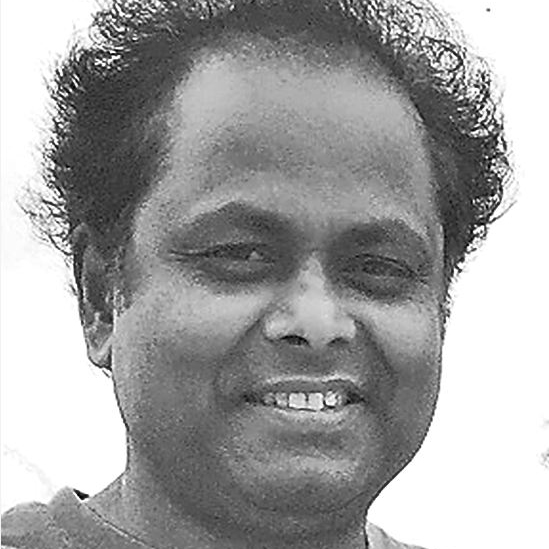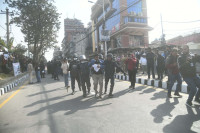Opinion
Prosecution versus persecution
Dixit’s arrest has gladdened some, angered others, and confused many
Pramod Mishra
Kanak Mani Dixit’s arrest by the Commission for Investigation of Abuse of Authority (CIAA) has gladdened some, angered others, and confused many. While free speech practitioners and believers have condemned his arrest and urged for his release, many who dislike Dixit for one reason or another have experienced schadenfreude. Many others have invoked the rule of law to take its course and let it vindicate his innocence or find him guilty in the courts. In my view, this is time for neither confusion nor schadenfreude. Instead, Nepalis must constantly choose between full democracy and a vendetta-driven rule by fear of those of the ancient regime.
Not the favourite
I have never met Dixit in person, nor have I been a fan of his writings in the media. In fact, I have very often thrown my hands up in despair at his condescending preaching to the Madhesis for their inability to look after their interest in Nepal’s federal future, at his Ahab-like lopsided understanding and condemnation of the Maoists and their decade-long insurgency, and at his aversion to the post-2006 Nepal of multiplicities, heterogeneity and an open struggle for ethnic equality through identity-recognised, identity-inclusive federalism. From his newspaper writings, Dixit has appeared to me as a voice of Kathmandu’s establishment that welcomes liberal democracy and opposes autocracy as long as the democracy remains hill-caste dominated, Nepali-speaking monolingual, and cosmetically transformative. While reading his writings in the media, I have often wondered if he reads the long-form, in-depth, academically-informed writings by scholars in his own publications, such as the old Himal and the new Himal South Asian. In such moments, I have told myself that publishers do not have to read everything that comes out of their publishing houses, nor does a journalist need to delve deeper into scholarship, theory or history to understand social, political and cultural events. In my columns, I have directly and indirectly responded to his writings and presented the opposite perspective.
For example, like him I have criticised the Maoists for ushering in a culture of violence in the country. But unlike him, I have also acknowledged their contribution in raising the consciousness of the marginalised—the peasants, Madhesis, Janajatis, women and Dalits—in demolishing Nepal’s visible feudal structure, and in bringing new possibilities. Like him, I too believe that the Madhesis’ future lies in an united Nepal but, unlike him, I think that unless the Madhesis and other marginalised groups have their own political, cultural and linguistic control of their regions or communities in the electoral system and have access to the central state through a structural arrangement of multilingualism and multiculturalism, their—the majority among them and not necessarily the minority upper castes—marginalisation will never end. But somehow, Dixit refuses to see the deep structures of marginalisation, limiting himself only to the surface of it and short-term fixes.
Legal versus moral
Yet, his work in the media has forced me to examine my own assumptions, conclusions and understanding of the Nepali situation and vet them through the fire of criticism, logic and opposite perspective. Similarly, one can ask if Dixit, by his unrelenting attack on the Maoists and their leadership, helped in a small way to force the core of the Maoist party to desist from their violent path after the 2006 second people’s movement. Or, his contribution to the civil society movement and the restoration of people’s trust in the Nepali Congress and the CPN-UML after the 2005 coup by the then king Gyanendra at a time when the leaders of the two parties were despised for their misrule and for ushering in an era of political chaos and corruption since 1990.
Dixit opposed the king’s coup and the Royal Nepal Army’s violations the same way he opposed the Maoists’ devious ways, manipulation and violence. He opposed Lokman Singh Karki’s appointment to the post of the CIAA chief the same way he opposed India’s blockade while remaining committed to republicanism. These are no mean achievements despite his blindness to the ideological and structural ways in which many groups in Nepal have been marginalised in stages since the Shah takeover in 1769.
Should Dixit’s fearless contribution to the restoration of democracy and public discourse, his opposition to violence and violation of human rights, and his role as an intrepid publisher provide him immunity from prosecution if he violates the law? Certainly not. But prosecution, if not done right, can turn into persecution.
Given Dixit’s role as one of the key leaders of the civil society movement against the royal coup of 2005, given his opposition to Karki’s appointment (because the latter was one of the key drivers behind Gyanendra’s repression and had risen through the ranks of the bureaucracy without open competition and through special orders of the palace (hukum pramangi), given the Supreme Court’s injunction to the CIAA in advocate Shambhu Thapa’s case not to go beyond its constitutional limits (as Thapa, like Dixit, had opposed Karki’s appointment on the same grounds), the present CIAA had and has no moral right to go after Dixit even if he has indulged in corruption. What the CIAA under Karki’s tutelage has done may be legal but it is not moral and ethical because anyone can easily see a conflict of interest and a case of vendetta here.
A bad precedent
The CIAA’s action against Thapa and Dixit has diminished and defamed an august Nepali institution of the post-2006 era; it has made the very act of investigating the corrupt suspect because even if Dixit is corrupt—which nobody can say right now based on hearsay that he is—this very act of seeming vendetta vitiates any future case against Dixit into an act of vengeance. The CIAA’s suspect motive in this case makes its cases against others untrustworthy, giving the really corrupt an excuse to say that they, too, were framed for a personal vendetta, a perennial song of the corrupt in any society, making corruption an original sin for Nepalis from which nobody is immune and, therefore, normalising corruption. Even if Dixit had been found to have involved in outrageous corruption, something like an independent inquiry, grand jury hearing or vetting of evidence by the Supreme Court would be an indispensable requirement before arresting him, given the history of both Karki and Dixit. Otherwise, what the CIAA has done becomes a blatant, intolerable act of harassment and violation of a citizen’s rights.
Karki and Dixit will be forgotten in the scheme of things, but building a public institution and maintaining its integrity, respecting an individual’s right and dignity in democracy and establishing a fair and just means to administer the law require much effort and sacrifice. To destroy them on the other hand, as the CIAA under its chief has done, does not take much effort. For this, the leaders of the UML, NC and Maoist parties are to blame for initiating the process in the first place by pushing through Karki’s appointment to such an august constitutional body in the post-2006 era.




 8.12°C Kathmandu
8.12°C Kathmandu










